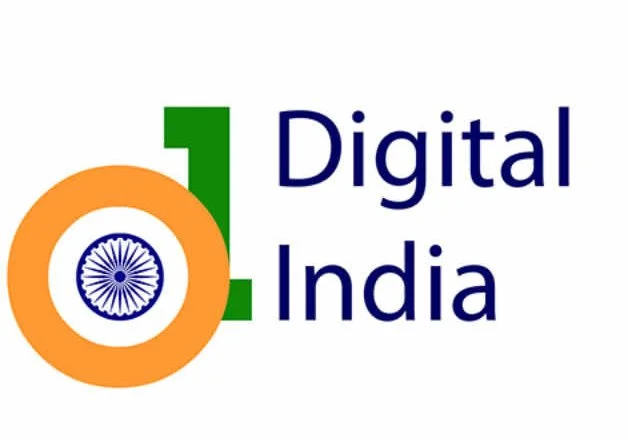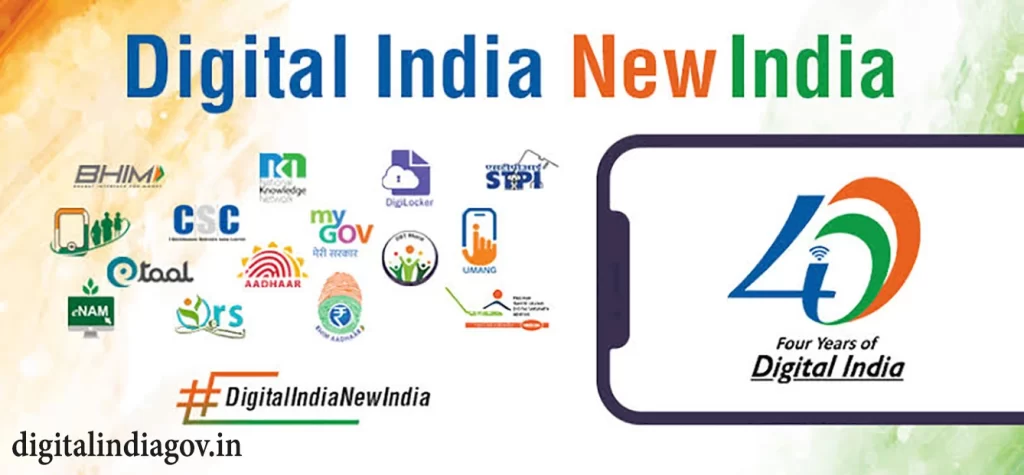Digital India is a campaign launched by the Government of India to ensure that the services the government provides to citizens by improving electronic by improving online infrastructure and by increasing internet connectivity or strengthening digital technology. So This initiative includes a plan to connect rural areas to high -inconsideration internet networks. So This includes three main components. The development of safe and stable digital infrastructure, distribution of digital government services and universal digital literacy.
Launched by Indian Prime Minister Narendra Modi on 1 July 2015, it is both beneficiaries and beneficiaries of other major schemes in India, such as Bharatnet, Make in India, Startup India, Standup India, Industrial Corridor, Bhadia and Sagarmala. So As of 31 December 2018, India’s population was 130 crore people (1.3 billion), 123 crores (1.23 billion) Aadhaar digital biometric identity cards, 121 crore (1.21 billion) mobile phones, 44.6 crores (446 million) smartphones, 56 crores. (560 million) So In December 2017, 481 million people (35%of the total population of the country) and a 51 per cent increase in e-commerce internet users.
Also Read:- E-Shraaam Card Registration
Contents
In Hindi
डिजिटल इंडिया भारत सरकार द्वारा यह सुनिश्चित करने के लिए शुरू किया गया एक अभियान है कि सरकार की सेवाएं ऑनलाइन बुनियादी ढांचे में सुधार करके और इंटरनेट कनेक्टिविटी बढ़ाकर या डिजिटल तकनीक को मजबूत करके इलेक्ट्रॉनिक में सुधार करके नागरिकों को प्रदान की जाती हैं। इस पहल में ग्रामीण क्षेत्रों को उच्च -इनकॉन्साइड इंटरनेट नेटवर्क से जोड़ने की योजना शामिल है। इसमें तीन मुख्य घटक शामिल हैं: सुरक्षित और स्थिर डिजिटल बुनियादी ढांचे का विकास, डिजिटल सरकार सेवाओं का वितरण और सार्वभौमिक डिजिटल साक्षरता।
भारतीय प्रधान मंत्री नरेंद्र मोदी द्वारा 1 जुलाई 2015 को लॉन्च किया गया, यह भारत में अन्य प्रमुख योजनाओं के लाभार्थी और लाभार्थी दोनों हैं, जैसे कि भारतनेट, मेक इन इंडिया, स्टार्टअप इंडिया, स्टैंडअप इंडिया, इंडस्ट्रियल कॉरिडोर, भादिया और सतारमला। 31 दिसंबर 2018 तक, भारत की आबादी 130 करोड़ लोगों (1.3 बिलियन), 123 करोड़ (1.23 बिलियन) आधार डिजिटल बायोमेट्रिक आइडेंटिटी कार्ड, 121 करोड़ (1.21 बिलियन) मोबाइल फोन, 44.6 करोड़ (446 मिलियन) स्मार्टफोन, 56 करोड़ की थी। (560 मिलियन) दिसंबर 2017 में, 481 मिलियन लोग (देश की कुल आबादी का 35%) और ई-कॉमर्स इंटरनेट उपयोगकर्ताओं में 51 प्रतिशत की वृद्धि।

History
Digital India Is launching by Prime Minister Narendra Modi on 1 July 2015, with the objective of connecting rural areas with a high-internet network and improving digital literacy. The vision of the Digital India program is inclusive growth in the fields of electronic services, products, and manufacturing. And job opportunities. It focuses on three major areas – digital infrastructure as a utility on the demand for every citizen, governance. And services, and digital empowerment of citizens.
डिजिटल इंडिया को प्रधान मंत्री नरेंद्र मोदी द्वारा 1 जुलाई 2015 को लॉन्च किया गया था, जिसमें ग्रामीण क्षेत्रों को उच्च -इनटर्नट नेटवर्क से जोड़ने और डिजिटल साक्षरता में सुधार करने का उद्देश्य था। डिजिटल इंडिया कार्यक्रम की दृष्टि इलेक्ट्रॉनिक सेवाओं, उत्पादों, विनिर्माण और नौकरी के अवसरों के क्षेत्र में समावेशी वृद्धि है। यह तीन प्रमुख क्षेत्रों पर केंद्रित है – डिजिटल बुनियादी ढांचा प्रत्येक नागरिक, शासन और सेवाओं और नागरिकों के डिजिटल सशक्तिकरण की मांग पर एक उपयोगिता के रूप में।
Benefits of Digital India Mission
Digital India Mission is an initiative that includes a plan to connect rural areas of the country with high-internet networks. The public Internet Access Program is one of the nine pillars of Digital India. So In the digital adoption phase, India ranks in the top 2 countries globally. And India’s digital economy is likely to cross $ 1 trillion by 2023.
Digital India has some advantages:
- Electronic transactions related to e-governance have increased.
- An optical fibre network of 2, 74,246 km connects to 1.15 lakh gram panchayats under the Bharat Net Program.
- Through computer and internet access, CSC provides multimedia content related to e-governance, education, health, telemedicine, entertainment and other government and private services.
- Establishment of digital villages with well-equipped features like solar lighting, LED assembly unit, sanitary napkin production unit and Wi-Fi Chupa.
- Internet data use as a major tool for the distribution of services and urban internet penetration has reached 64%.
Suggested Link:- Data Entry Jobs Online
#SupriyaGupta
